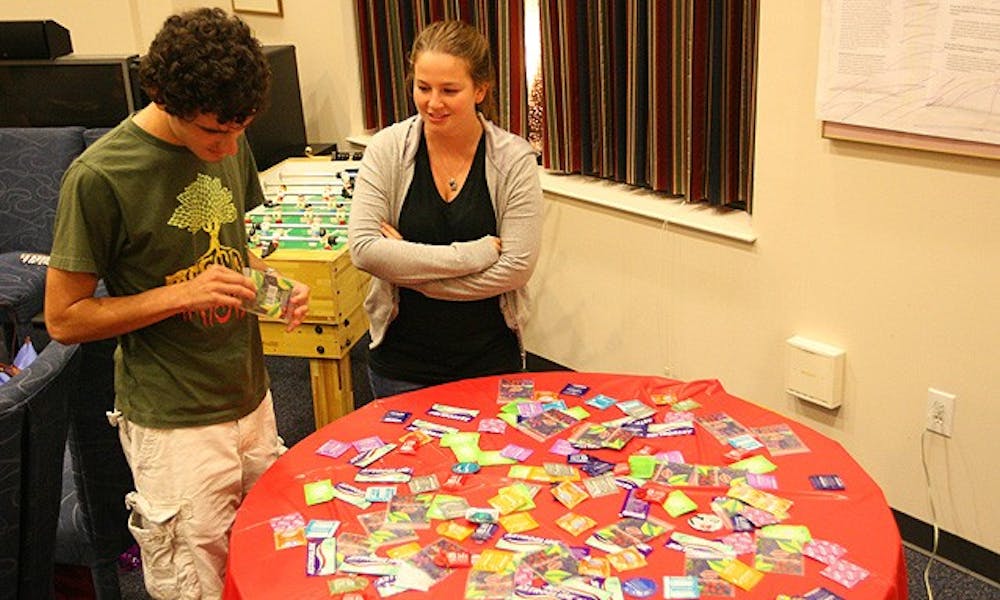Although few teenagers would feel comfortable talking to a rabbi about sex, Jewish Dukies openly discussed the topic at the Freeman Center for Jewish Life Monday night.
“Sex and the Sukkah” is part of a series of events held by the Freeman Center for the Jewish holiday of Sukkot. The program was also sponsored by Duke Hillel, Jewish Life at Duke, the Women’s Center and the Wellness Center.
Sukkot is celebrated by building and spending time outdoors in a hut known as a sukkah. According to Jewish tradition, it is considered a “mitzvah” or good deed to perform activities in the sukkah usually done at home, including eating and having sex.
“This event is a platform to discuss the Jewish perspectives on sex and what is considered healthy sexual behavior,” said junior Risa Isard, Jewish Life at Duke’s vice president for social action.
Condoms were also freely available as an incentive for students to practice safe sex and to encourage conversation regarding sexual practices and consent, Isard said.
The concept of the sukkah comes from the Torah, the Jewish scroll of law, said Rabbi Jeremy Yoskowitz, campus rabbi and assistant director for Jewish Life at Duke.
Judaism sanctifies the concept of marriage and monogamous relationships, Yoskowitz said. All extramarital relation, such as adultery, was explicitly forbidden.
The event was a discussion among about 20 students and was led by Yoskwotiz and Amy Cleckler, the gender violence program coordinator at the Women’s Center.
Yoskowitz opened the event by recounting a story in the Talmud where a young student, Rabbi Kahana, hid under the bed to observe his teacher, Rav, having intercourse with his wife.
“This story might be considered ludicrous today, but its moral is important,” Yoskowitz said. “There is learning to be had, even in sex. Sex is a part of life.”
Yoskowitz also showed the group one of the symbols of fertility in Judaism: the four species, composed of the branches of palm, willow, myrtle and yellow citron trees.
Yoskowitz then asked students to read some of the quotes from the Talmud regarding sex that were displayed on posters around the room.
“There has been never been a time in Judaism that sex has been a taboo,” he said. “But the question often comes up: What about premarital sex?”
Yoskowitz explained that in ancient times, sex was a way a couple could get married instead of the contractual form or the celebration that is done today. The concept of premarital sex only came about later, Yoskowitz said.
In response to a question about birth control, Yoskowitz said this topic is not specifically mentioned in the Talmud and its use would depend on a woman’s health risk.
Cleckler supplemented the discussion by explaining the importance of sexual consent in present-day society, adding that problems largely arise when couples do not communicate effectively.
“One of the great things about Judaism is that it is very sex-positive,” she said. “Sex is openly discussed in the religious texts.”
When asked about the acceptance of gays in Judaism, Yoskowitz explained that little is said about gays in the Talmud and that almost nothing is said about lesbians.
“Orientation is not necessarily forbidden, but action is,” Yoskowitz said, but he added that reform and conservative Jewish movements now ordain homosexuals as rabbis.
“I think the ordaining of gay rabbis shows where the Jewish community stands in relation to homosexuals,” Isard said.
A previous version of this story incorrectly reported that the Sukkah originates in the Talmud. Sukkah actually comes from the Torah. The article also should have clarified in addressing premarital sex that all sex outside of marriage was explicitly forbidden.
Get The Chronicle straight to your inbox
Signup for our weekly newsletter. Cancel at any time.

